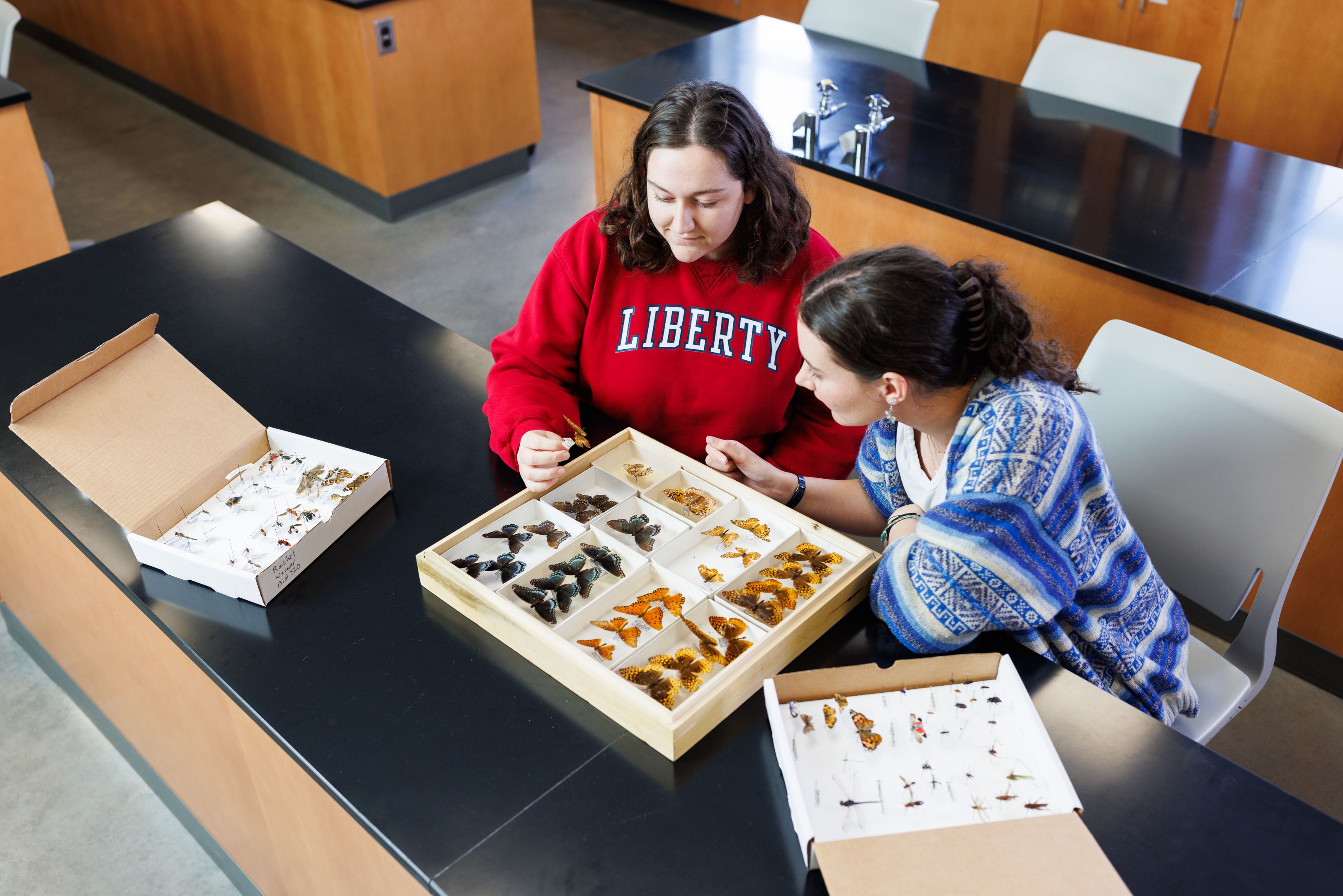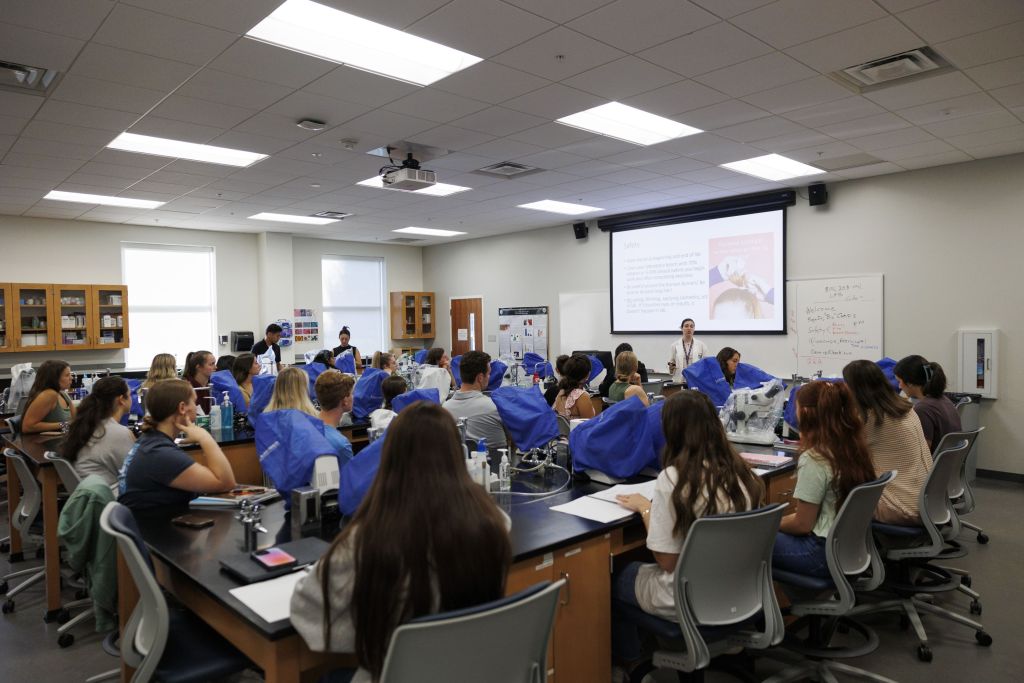
Bachelor’s in Zoo and Wildlife Biology Degree
Work Directly with Animals in Our Zoo and Wildlife Biology Bachelor’s Degree Program
Are you passionate about God’s creation? Have you always had a desire to work in animal science? Are you searching for a wildlife biology college degree that can help prepare you for a career in zoos and aquariums, animal nutrition, or wildlife/zoo biology? Pursue our Bachelor of Science (BS) in Zoo and Wildlife Biology degree and turn those interests into a career in animal science.
Our zoo and wildlife biology program is one of Liberty’s most interesting and exciting degrees. As a wildlife biology major, you can study animals and their behavior as you participate in labs, fieldwork, and an optional internship.
This degree can help prepare you to work as a zookeeper, curator, wildlife biologist, wildlife conservation officer, park naturalist, or animal care specialist, in addition to many other careers that involve working directly with animals. Why wait any longer? Start pursuing your passion today by earning a zoo and wildlife biology degree!
Can You Practice Veterinary Medicine with this Degree?
To practice veterinary medicine, you will need to have a veterinary license that can only be obtained through a Doctor of Veterinary Medicine (DVM) degree. Liberty’s undergraduate wildlife biology school program can help prepare you for vet school, but a bachelor’s degree alone does not meet the educational requirements for veterinary licensure. If you want to apply to vet school someday, this degree is an excellent choice for your undergraduate studies. Most veterinary programs prefer students who have an undergraduate degree in biology, physics, or a closely related area of study. Admission to vet school is competitive. Give yourself an advantage by majoring in wildlife biology at Liberty, and stand out in the applicant pool.
Credit Hours
View CoursesNext start date: Aug 24, 2026

Liberty University is accredited by SACSCOC
Highlights
Highlights of Our Zoo and Wildlife Biology Degree
Hands-On Learning in Every Lab
With lab components tied to nearly every course, you can gain practical experience that reinforces classroom instruction and prepares you for scientific work. This hands-on approach can help deepen your understanding of complex concepts and help equip you with skills relevant to real-world laboratory settings.
Expert Instruction from Experienced Faculty
Study under professors who hold advanced degrees and bring real-world insight into every lecture and lab session. Their academic expertise and professional backgrounds can enrich your academic experience and help bridge the gap between theory and practice.
Undergraduate Research Opportunities
Work alongside faculty on research projects that allow you to apply scientific methods and contribute to ongoing discoveries. These collaborative opportunities can also help strengthen your analytical skills and build a strong foundation for future academic or professional pursuits.
Field-Based Class Experiences
Some courses offer fieldwork that takes learning beyond the lab and into natural environments, where you can observe animal behavior and ecosystems firsthand. This immersive experience can enhance your observational and data collection skills while fostering a deeper appreciation for ecological systems.
Career Potential
What Can You Do with a Zoo and Wildlife Biology Bachelor’s Degree?
Liberty University’s Bachelor of Science in Zoo and Wildlife Biology can help prepare you for the following occupations:
- Animal care specialist
- Conservation officer
- Park naturalist
- Wildlife zoo biologist
- Zoo curator
- Zookeeper


#2 Best College Campus in America
At Liberty, you’ll find an affordable, high-quality education designed to help equip students like you for the real world. Our commitment to excellence has earned us recognition as the #2 Best College Campus in America by Niche.com for 2026.
Earning your degree from a nonprofit university with state-of-the-art resources like ours can help set you apart from your peers.
Courses
What Will You Study in Our Zoo and Wildlife Biology Degree?
As a student in our zoo and wildlife biology program, you’ll explore a curriculum designed to help prepare you for hands-on work with animals in a variety of settings. Through a blend of classroom studies, laboratory experiments, and field-based research, you can build the foundational knowledge and practical skills to start your journey in animal care, conservation, and research roles. From your very first courses, you’ll engage with material that brings science to life and gives you meaningful opportunities to connect your studies to real-world applications.
You’ll study a broad range of topics that are essential to understanding animal life and ecosystems. These include animal behavior, botany, comparative animal physiology, ecology, microbiology, parasitology, and vertebrate natural history. Your training won’t be limited to textbooks; instead, you can gain experience in labs and natural environments, where you can apply scientific methods and develop valuable observation and data analysis skills. Whether you’re preparing for graduate school, veterinary training, or a role in a zoo, sanctuary, or conservation organization, this degree is designed to help you grow both academically and professionally.
Featured Zoo and Wildlife Biology Degree Courses
BIOL 305 – Parasitology
BIOL 408 – Animal Behavior
BIOL 416 – Comparative Animal Physiology
BIOL 418 – Vertebrate Natural History
Degree Information
- This program falls under the School of Health Sciences
- View the Degree Completion Plan
- Check out our course catalog
- Transfer in up to 75% of the degree total
BENEFITS
Why Choose Liberty’s Wildlife and Zoo Biology Degree?
Your Success Is Our Mission
When you join the Liberty family, our top priority is helping you build a strong foundation for a career in the field you’re passionate about. We’re committed to providing you with the tools, support, and experiences that can empower you to pursue your goals with confidence.
Experienced, Faith-Driven Faculty
At Liberty, your professors bring more than just academic credentials, they offer real-world experience and a commitment to Christian values. These dedicated professionals are here to guide you through every step of your academic journey, offering both expertise and spiritual encouragement along the way.
Get Hands-On with Labs and Fieldwork
As an animal biology major, you won’t just study concepts, you’ll experience them. Through lab work and field-based experiences, you can gain a deeper understanding of what it’s like to observe, study, and care for animals in real-world settings.
Build Your Resume with Internship Opportunities
In addition to your coursework, you’ll have the option to pursue an internship that aligns with your career goals. This practical experience can help you stand out to future employers and give you a clearer vision of your path in animal science or wildlife biology.
Admissions
How Do You Become a Zoo and Wildlife Biology Degree Student?
Every application is reviewed by the admission committee on a case-by-case basis, meaning there are no set minimums for acceptance. However, all applicants must submit the following documents* for admission:
- Admission application
- Official high school transcripts
- Official college transcripts (if applicable)
- Admission essay
Results from the CLT, SAT, or ACT are not required for admission, but may be used in consideration for merit-based aid.
*Note that additional documentation may be requested by the admission committee after your application has been received.

Have Questions?
We’ll make sure you have the information you need to take your next step.